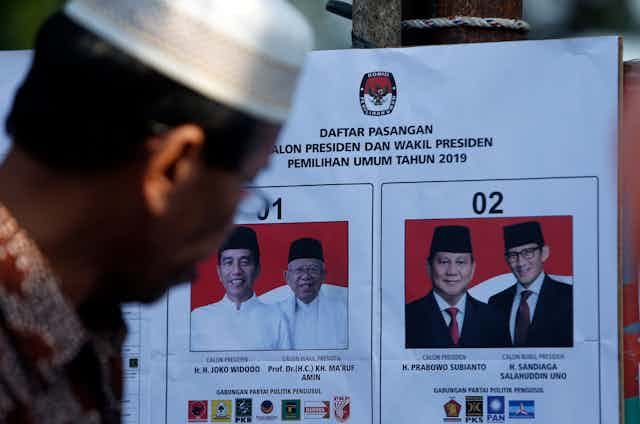The Indonesian public still needs to wait until May 22 to know the official tally of votes in the presidential election last week. But at least five credible survey agencies are forecasting the re-election of Joko “Jokowi” Widodo.
As the largest country in Southeast Asia, a region that’s facing growing security concern over the South China Sea as well as humanitarian issues in Myanmar with the persecution of ethnic Rohingya Muslims, whoever is elected as Indonesia’s president will determine how the country navigates its relations with regional neighbours and with the international community.
With the vast difference in style between Jokowi, a former furniture businessman turned politician, and his opponent, former military general Prabowo Subianto, one might think they would have very different foreign policy strategies. But that’s not the case.
Prabowo shares Jokowi’s ambition to boost “Indonesia’s active role in international affairs”, as shown in his policy paper.
Whoever wins the election, Indonesia’s “free and active” foreign policy, in which Indonesia does not align with any superpower and has an active role in contributing to world peace, will remain.
Indonesia’s foreign policy remains intact
The president is bound by the Indonesian Constitution and existing regulations not to align the nation with any major powers.
Indonesia’s first president, Sukarno, introduced this policy after Indonesia gained independence in 1945. At that time, the United States and the Soviet Union, the major superpowers, were fighting for influence around the world.
With the fall of the Soviet Union in 1991, the US became the world’s strongest power. But today power relations have shifted from the global “North” to the “South” with the rise of powers such as Brazil, Russia, India, China and South Africa.
If the new president chooses to abandon this policy and take sides, this may disrupt the global order.
Possible changes
Despite the set-in-stone foreign policy, presidents still have room to modify how Indonesia implements its foreign policy. They can design a particular slogan to represent their strategies.
This slogan signals Indonesian foreign policy’s direction and priorities.
Sukarno’s foreign policy slogan was “rowing between two reefs”. It represented Indonesia’s position as a newly independent country that would not take sides between the United States and the Soviet Union.
Indonesia’s sixth president, Susilo Bambang Yudhoyono, popularly called SBY, also introduced foreign policy slogans during his two terms from 2004 to 2014. The first was “Navigating in Turbulent Oceans”, which was followed by “Zero Enemy, A Thousand Friends”.
SBY’s slogans suggested Indonesia’s cautious steps amid growing uncertainty and a changing global order. At the same time, the slogans encouraged the country to befriend any country, which helped Indonesia advance its national interests.
Jokowi introduced “Global Maritime Fulcrum” as a foreign policy slogan in 2014. The slogan sought to advance Indonesia’s strategic interests as an archipelagic state.
Between Jokowi and Prabowo
Both Jokowi and Prabowo hinted at the direction of their foreign policy strategies during the fourth presidential debate last March.
Jokowi pointed out Indonesia’s success as a mediator in conflicts involving Afghanistan and Rohingya in Myanmar. Learning from these successes, Jokowi wanted the country to capitalise on its status as the world’s largest Muslim-majority country.
Jokowi’s 38-page policy paper shows Indonesia would focus on “promoting total diplomacy, peace diplomacy, and human diplomacy” to strengthen Indonesia’s leadership in international forums under his administration. The paper was submitted to the General Election Commission, as required of presidential candidates.
On the other hand, Prabowo’s foreign relations standpoint is similar to SBY’s “Zero Enemy, A Thousand Friends” policy. However, during the debate, Prabowo emphasised the need to build a stronger military power to anticipate wars that might break out any time.
Prabowo’s inclination might be influenced by his military background. He was involved in a number of military operations in East Timor since the 1970s.
What’s ahead for the new president
In addition to the South China Sea dispute and the persecution of Rohingyas, Indonesia also has to consider other growing security concerns, including possible conflict on the Korean Peninsula. It must also tackle transnational crime, terrorism and violence extremism in the region.
When the new president is inaugurated in October, Indonesia will still have a non-permanent seat at the Security Council. The president will be responsible for representing the Asia-Pacific region in the UN’s most powerful body.
The president will be expected to chair Security Council debates during Indonesia’s second year on the council.
Indonesia is also hoping to secure a seat on the UN Human Rights Council by fall 2019. Indonesia has been campaigning for this position since earlier this year.
Indonesia’s new president should not abandon the Association of Southeast Asian Nations (ASEAN), its vehicle to become a regional powerhouse. As one of ASEAN’s founding nations, Indonesia is often considered its “natural leader”.
Indonesia is leading the drafting process of a strategy to enhance connectivity between countries in the Indian and Pacific oceans. If adopted, the strategy will make ASEAN central among countries from the shores of Africa to the Americas.
The new president might continue the already established foreign policy direction regionally and globally. While it might be too early to comment definitively on the foreign policy direction of either Jokowi or Prabowo, it will be too risky for both to retract from Indonesia’s current world standpoint.


